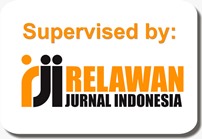DISKURSUS MORAL HAZARD SEBAGAI EKSISTENSI HUMANITARIAN SUPPLY CHAIN MANAGEMENT JAMINAN KESEHATAN DI KOTA SURABAYA
Abstract
ABSTRAK
Penelitian ini menganalisis diskursus moral hazard dari penyelenggara negara dalam upaya meningkatkan humanitarian supply chain jaminan kesehatan di Kota Surabaya. Metode penelitian ini merupakan penelitian kualitatif yang menginterpretasikan moral hazard melalui perangkat teori moralitas Immanuel Khan. Metode ini dianggap tepat dengan penggunaan data primer dan sekunder yang ada. Data primer didapatkan berdasarkan observasi secara langsung, indepth interview, dan focus group discussion. Lebih lanjut data sekunder didapatkan dari literatur masa lampau, studi, buku, penelitian, dan dokumen penting lainnya. Fokus penelitian ini adalah moral hazard dan humanitarian supply chain. Kesimpulan penelitian menunjukkan moralitas hubungan manusia dengan manusia lain memiliki kelebihan dan keunggulan pda moralnya. Morallah yang menunjukkan hakikat umat manusia. Kant mengemukakan pendapat bahwa manusia tidak boleh diterapkan sebagai salah satu tujuan. Dalam hal percepatan penanganan di bidang kesehatan efisiensi dan efektivitas dari pengobatan maupun pelayanan sangatlah penting mengingat urgensi dari permasalahan kesehatan yang tinggi. Terbukti dengan penggunaan teknologi dalam negeri yang masih minim meskipun kita tidak menutup mata bahwa ada beberapa teknologi yang digunakan akan tetapi tingkat efektifitasnya masih rendah. Kemajuan teknologi di bidang kesehatan menjadi salah satu tantangan Indonesia kedepan utamanya sebagai peningkatan layanan kesehatan dan stabilitas supply chain.
ABSTRACT
This study analyzes the moral hazard discourse of state organizers in an effort to improve the humanitarian supply chain of health insurance in the city of Surabaya. This research method is a qualitative research that interprets moral hazard through immanuel Khan's morality theory. This method is considered appropriate with the use of existing primary and secondary data. Primary data were obtained based on direct observation, indepth interviews, and focus group discussions. Furthermore, secondary data were obtained from past literature, studies, books, research, and other important documents. The focus of this research is moral hazard and humanitarian supply chain. The conclusions of the study show that the morality of human relations with other human beings has its advantages and advantages. It is morals that show the nature of mankind. Kant put forward the opinion that human beings should not be applied as one of the goals. In terms of accelerating treatment in the health sector, the efficiency and effectiveness of treatment and services is very important considering the urgency of high health problems. It is proven by the use of domestic technology which is still minimal although we do not close our eyes that there are some technologies used, but the level of effectiveness is still low. Technological advances in the health sector are one of Indonesia's challenges in the future, especially as improving health services and supply chain stabilityFull Text:
PDF (Bahasa Indonesia)References
Apriliansyah, M., Widyastuti, T., & Bahri, S. (2021). Pengaruh Supply Chain Terhadap Kinerja Keuangan Dengan Kepuasan Pelanggan Dan Loyalitas Pelanggan Sebagai Variabel Intervening Pada Kerja Sama Operasi Rumah Sakit. Jurnal Apresiasi Ekonomi, 9(2), 238–250. https://doi.org/10.31846/jae.v9i2.394
Dubey, R., & Gunasekaran, A. (2016). The sustainable humanitarian supply chain design: agility, adaptability and alignment. International Journal of Logistics Research and Applications, 19(1), 62–82.
Fawcett, S. E., McCarter, M. W., Fawcett, A. M., Webb, G. S., & Magnan, G. M. (2015). Why supply chain collaboration fails: the socio-structural view of resistance to relational strategies. Supply Chain Management: An International Journal.
Heaslip, G., Kovács, G., & Haavisto, I. (2018). Innovations in humanitarian supply chains: the case of cash transfer programmes. Production Planning and Control, 29(14), 1175–1190. https://doi.org/10.1080/09537287.2018.1542172
Hull, J. C., & Basu, S. (2018). Options, future & other derivatives. Pearson Education.
Jawapost. (2022). 96,48 Persen Penduduk Surabaya Ter-Cover BPJS Kesehatan. https://www.jawapos.com/surabaya/02/06/2021/9648-persen-penduduk-surabaya-ter-cover-bpjs-kesehatan/
Larasati, A. F. (2020). Nilai Moral dalam Novel Koplak Karya Oka Rusmini (Kajian Moralitas Immanuel Kant). Bapala, 7(1), 20.
Nismawati, I., & Mahadewi, E. P. (2022). Implication of BPJS for Private Health Insurance Marketing and Business Competition in Indonesia. 24, 580–588.
Permana, B. A. (2021). Sekretariat Daerah Kota Tasikmalaya the Effect of Organizational Culture Toward Regional Secretariat Employees Performance of Tasikmalaya. 9, 1–7.
Prasanna, S. R., & Haavisto, I. (2018). Collaboration in humanitarian supply chains: an organisational culture framework. International Journal of Production Research, 56(17), 5611–5625. https://doi.org/10.1080/00207543.2018.1475762
Puspaningsih, M., Suryawati, C., & Septo Pawelas Arso. (2022). Evaluasi Administrasi Klaim BPJS Kesehatan Dalam Menurunkan Klaim Pending. Jurnal Ilmiah Indonesia, 7(8.5.2017), 2003–2005.
Rahmawati, N. F., Toana, R. D. A., & Sofyan, M. (2021). Customer Relationship Marketing Di Ramayana Departement Store Pada Masa Pandemic Covid-19. Jurnal Apresiasi Ekonomi, 9(3), 372–378. https://doi.org/10.31846/jae.v9i3.425
Rodon, J., Serrano, J. F. M., & Gimenez, C. (2012). Managing cultural conflicts for effective humanitarian aid. International Journal of Production Economics, 139(2), 366–376.
Rostamkalaee, Z. K., Jafari, M., & Gorji, H. A. (2022). Demand-side Interventions to Control Moral Hazard in Health Systems, Beneficial or Detrimental: A Systematic Review Study. Medical Journal of the Islamic Republic of Iran, 36(1). https://doi.org/10.47176/mjiri.36.69
Sufiyan, Zulkifli, & Derriawan. (2021). Strategi Kinerja Karyawan Untuk Meningkatkan Kinerja Perusahaan Pada PT. Swadharma Sarana Informatika. 9, 180–190.
Ware, O. (2016). Skepticism in K ant’s Groundwork. European Journal of Philosophy, 24(2), 375–396.
Wiasa, I. N. D., Parsa, I. W., & Kartika, I. G. A. P. (2022). Model of National Health Insurance Arrangements Based on Justice and Social Welfare. International Journal of Multicultural and Multireligious Understanding, 9(2), 701–710.
Widianto, T., & Khristiana, Y. (2021). Dampak Sistem Remunerasi Terhadap Kinerja Manajerial. Jurnal Apresiasi Ekonomi, 9(1), 67–77. https://doi.org/10.31846/jae.v9i1.356
DOI: https://doi.org/10.31846/jae.v10i3.483
Refbacks
- There are currently no refbacks.

This work is licensed under a Creative Commons Attribution-NonCommercial-NoDerivatives 4.0 International License.
e-Jurnal Apresiasi Ekonnomi Indexed by:












